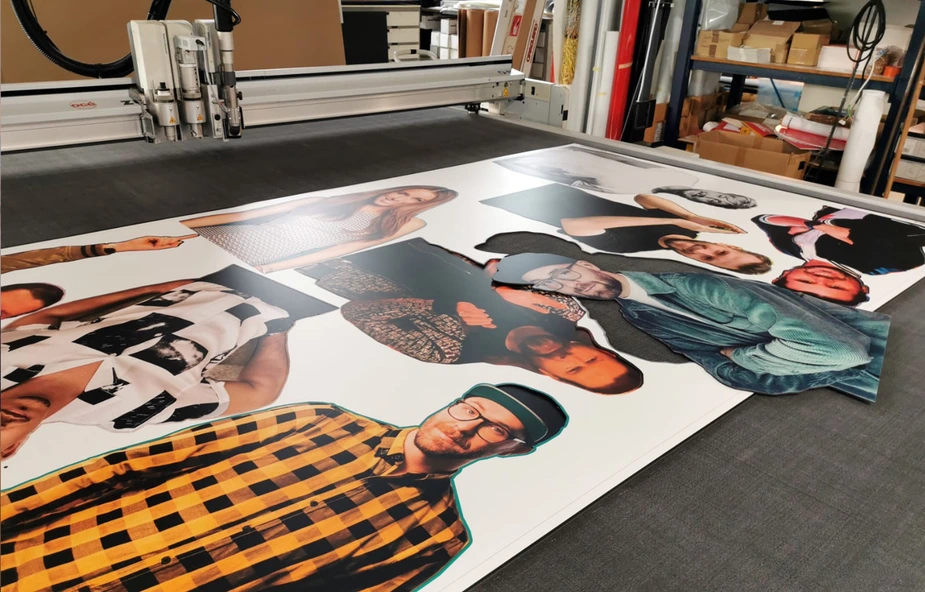An incisive experience in the company's 30-year history
Rost Werbetechnik is fighting for survival and created the “Cardboardience”

At first glance, it seems like the TV studio is full. Every second audience member, however, is made of cardboard. Since mid-March 2020 well-known German TV shows have been shooting without an audience for safety reasons. One of the shows recorded in Adlershof was “The Voice of Germany”. The few “actual” studio guests were the participants’ next of kin. All the other seats were filled with a cardboard audience, complete with selfies of real-life fans. This “Cardboardience” was processed, cut out, and printed by the Adlershof-based company Rost Werbetechnik, which turned 30 in 2020. It has been a year that founder and manager Peter Rost “won’t mind forgetting”.
In the course of their business career, Peter Rost and Jana Arnold have been through a lot together. The founding of their company happened amidst the turbulent time of the Wende, the period of change during and after reunification. Peter Rost, who has a degree in physical education, “fell out of favour” just before the socialist German Democratic Republic’s (GDR) demise and then lost his job as a scientific assistant at university. “I was unemployed for three or four days,” he remembers, “which didn’t actually exist.” Without training, he started working in a friend’s silk screen print shop and later started an apprenticeship as a screen printer. He wanted to become self-employed in the GDR, but that wasn’t easy. “Reproduction companies were a sensitive subject,” says Rost. However, he eventually received a permit and opened his shop in a neglected, unlettable flat. Half a year later – after reunification – Jana Arnold lost her job as a court assistant at a municipal district court. “All GDR courts closed on the 3 October.” Jana Arnold joined her husband’s company, started writing invoices, and took up bookkeeping for reasons of practicality. “Learning by doing,” she remembers, “those were wild times.”
Wild times during which they learned many things to their cost. Some invoices were never paid; technology and equipment of the competition in West-Berlin were decades ahead. They asked other former GDR businesses for orders, printed stickers and posters. In 1992, they invested half a million Marks into equipment. “These sums were inconceivable and scare to us. We weren’t socialised towards this,” she says in hindsight. When a passion project failed, they were threatened by insolvency. “We were too idealistic,” says Jana Arnold, “we thought the money will come somehow.” But it didn’t. They managed to find a way out of the crisis by going to a “round table” event with an advisor from the Chamber of Commerce. It went uphill from there. Their makeshift company headquarters in Schöneiche became too small. It was said advisor in 2006 who asked them: “Why don’t you build a new headquarters?” Rost saw a phone number on an ad sign of Adlershof Projekt GmbH. Then everything happened rather quickly. The groundbreaking was in December 2006, the new headquarters was up half a year later.
“The best thing that could have happened to us,” says Jana Arnold today. “At the time, it felt like moving to the countryside. There was nothing around us and you could see rabbits hopping across the field in the evening.” Berliners then still considered Adlershof to be “out in the sticks”. That changed very quickly, they say, with a tinge of nostalgia. Today they are “somewhat surrounded”.
Even though the on-site synergies leave something to be desired – “which is probably due to our line of business” – they are both happy in Adlershof. Studio Hamburg and their production company are both important customers.
The screen-printing shop has long since turned into a full-scale advertising equipment company with customers from the trade fair, exhibition and events industry. Their customers also include many museums. Unfortunately, all those industries that were hit the hardest by the pandemic. Rost describes their anniversary year as an “incisive experience”. “It began when the ITB travel trade show was cancelled, and gradually more and more orders were cancelled too.” Peter Rost reacted with “panic”, as he says, couldn’t think clearly, sleep, or sit still. The question of all questions: “How long can we last?” And all this for the 30-year anniversary.
Jana Arnold, too, was worried. After the initial shock, however, she started crunching numbers. Save money, go to standby, apply for furlough schemes. “With her plan,” her husband remembers, “we could look ahead a bit more calmly.” With summer came hope and some smaller orders. “We started producing things needed in a pandemic,” says Peter Rost, “masks, spit guards, stickers.”
The situation hasn’t changed much so far. “We are trying to reconfigure what we do, focus more on office design, outdoor advertising, and decorating vehicles.
After the “Cardboardience” in Berlin, more followed in Cologne and Munich. Peter Rost, Jana Arnold, and their colleagues can also be seen sitting among the crowd.
By Rico Bigelmann for Adlershof Journal